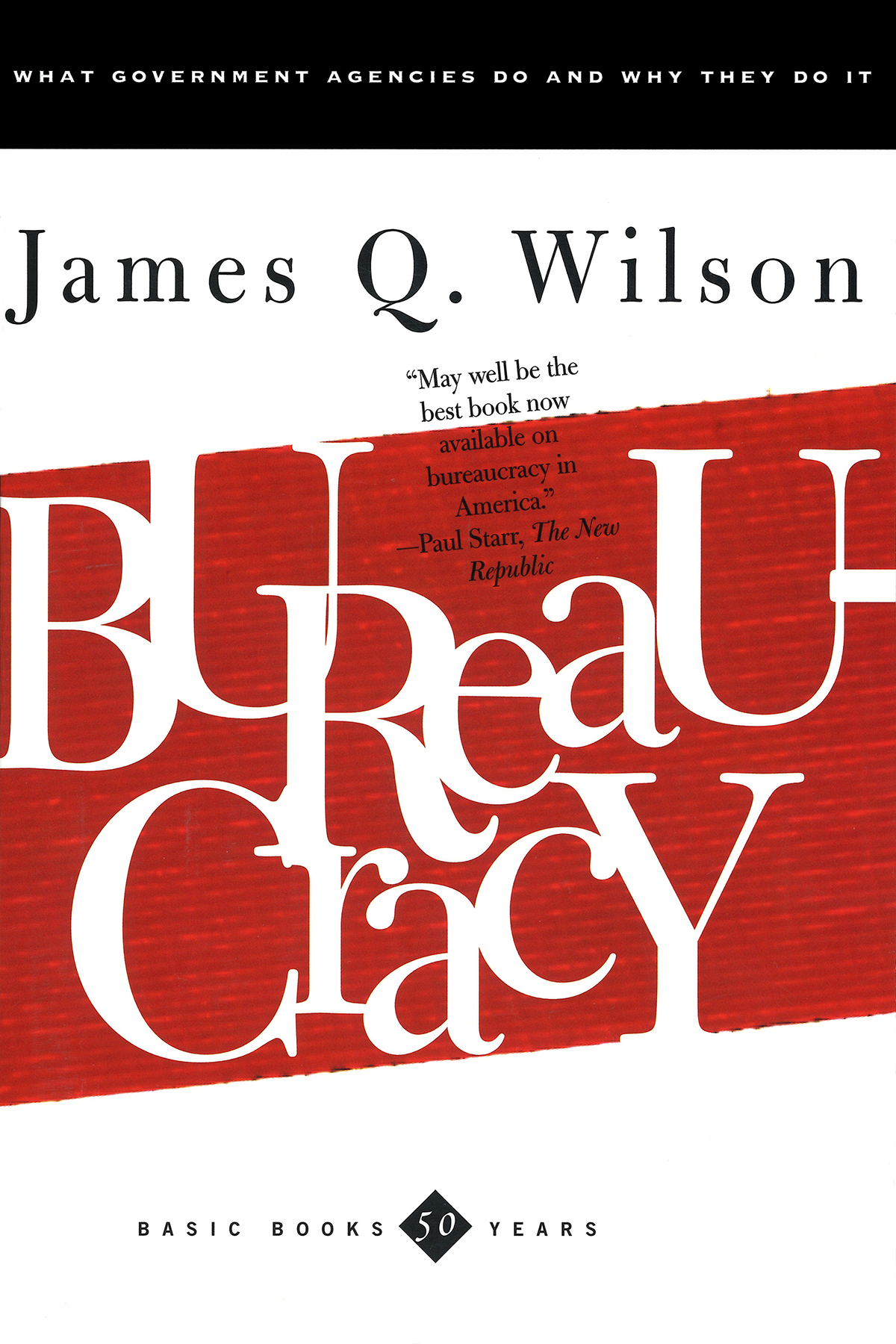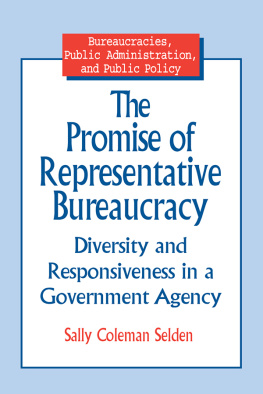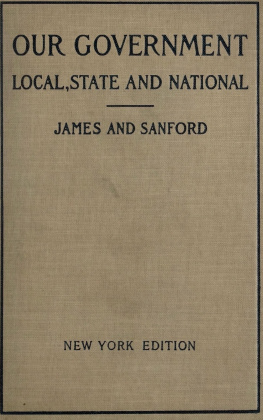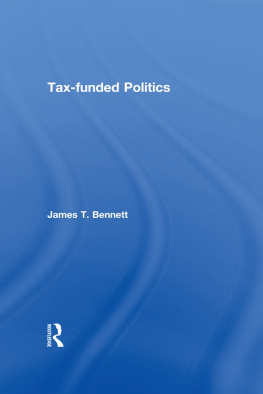James Q. Wilson - Bureaucracy : what government agencies do and why they do it
Here you can read online James Q. Wilson - Bureaucracy : what government agencies do and why they do it full text of the book (entire story) in english for free. Download pdf and epub, get meaning, cover and reviews about this ebook. year: 2000, genre: Politics. Description of the work, (preface) as well as reviews are available. Best literature library LitArk.com created for fans of good reading and offers a wide selection of genres:
Romance novel
Science fiction
Adventure
Detective
Science
History
Home and family
Prose
Art
Politics
Computer
Non-fiction
Religion
Business
Children
Humor
Choose a favorite category and find really read worthwhile books. Enjoy immersion in the world of imagination, feel the emotions of the characters or learn something new for yourself, make an fascinating discovery.

- Book:Bureaucracy : what government agencies do and why they do it
- Author:
- Genre:
- Year:2000
- Rating:4 / 5
- Favourites:Add to favourites
- Your mark:
- 80
- 1
- 2
- 3
- 4
- 5
Bureaucracy : what government agencies do and why they do it: summary, description and annotation
We offer to read an annotation, description, summary or preface (depends on what the author of the book "Bureaucracy : what government agencies do and why they do it" wrote himself). If you haven't found the necessary information about the book — write in the comments, we will try to find it.
Bureaucracy : what government agencies do and why they do it — read online for free the complete book (whole text) full work
Below is the text of the book, divided by pages. System saving the place of the last page read, allows you to conveniently read the book "Bureaucracy : what government agencies do and why they do it" online for free, without having to search again every time where you left off. Put a bookmark, and you can go to the page where you finished reading at any time.
Font size:
Interval:
Bookmark:

Copyright 1989 by Basic Books, Inc.
Preface to the New Edition Copyright 2000 by Basic Books
Hachette Book Group supports the right to free expression and the value of copyright. The purpose of copyright is to encourage writers and artists to produce the creative works that enrich our culture.
The scanning, uploading, and distribution of this book without permission is a theft of the authors intellectual property. If you would like permission to use material from the book (other than for review purposes), please contact permissions@hbgusa.com. Thank you for your support of the authors rights.
Basic Books
Hachette Book Group
1290 Avenue of the Americas, New York, NY 10104
www.basicbooks.com
First Edition: 1989
Published by Basic Books, an imprint of Perseus Books, LLC, a subsidiary of Hachette Book Group, Inc. The Basic Books name and logo is a trademark of the Hachette Book Group.
The Hachette Speakers Bureau provides a wide range of authors for speaking events. To find out more, go to www.hachettespeakersbureau.com or call (866) 376-6591.
The publisher is not responsible for websites (or their content) that are not owned by the publisher.
The Library of Congress has cataloged the trade paperback edition as follows:
Wilson, James Q
Bureaucracy : what government agencies do and why they do it / James Q. Wilson
p. cm.
Includes bibliographical references and index
ISBN-13 978-0-465-00785-1
ISBN-10 0-465-00785-6
1. Administrative agenciesUnited States. 2. BureaucracyUnited States. I. Title.
JK421.W52 1989
353.01dc20
8942527
CIP
ISBN: 978-1-5416-4625-4 (2019 ebook)
E3-20190723-JV-NF-ORI
To the Harvard Graduate Students
From Whom I Have Learned So Much
Explore book giveaways, sneak peeks, deals, and more.


O NE OF THE CENTRAL THEMES of this book is that the management of government agencies is powerfully constrained by limitations on the ability of managers to buy and sell products or hire and fire people on the basis of what best serves the efficiency or productivity of the organization. Laws and regulations limit how people can be hired, greatly reduce the chances of firing anyone, and surround the buying and selling of buildings and equipment with countless rules about fairness and procedure.
There have been efforts over the last decade to alter these constraints. President Bill Clinton and Vice President Al Gore sought at the start of their first term to convert federal agencies into a government that works better and costs less by reducing red tape, inducing bureaus to put customers (that is, citizens dealing with the government) first, and empowering employees to get results. This effort was officially known as the National Performance Review (NPR) and popularly known as Reinventing Government, or REGO.
The NPR effort marked a sharp departure from past reorganization plans. Of the seventeen presidents to take office between 1904 and 1992, eleven created reorganization task forces that were chiefly devoted to expanding accountability, increasing efficiency, and enlarging presidential authority. (By accountability I mean increasing policy implementers responsiveness to higher officials who must take responsibility for that policy.) This effort had some successesfor example, it equipped the president with more staff assistants and made more rational the way in which budgets were drawn upbut it did little about red tape.
The NPR began with very different assumptions. Where earlier reforms had stressed the accountability of officials to higher authority, the NPR emphasized agency responsiveness to the public. Where earlier reports relied on appeals to business efficiency, the NPR drew inspiration from the concept of entrepreneurial culture. And where preceding efforts urged an expansion of the power of the president, the NPR called for empowering government employees and restoring public confidence in government.
The dominant theme of the NPR was to solve the root problem of modern governmentits excessive reliance on large, top-down, centralized bureaucracies. This solution necessitated the creation of entrepreneurial organizations that have constantly learned, innovated, and improved. The NPR meant, in effect, marrying the youthful spirit of Silicon Valley to the old traditions of official Washington.
The main reason for this startling shift in federal reorganization efforts, however, was not admiration for clever young people who made computer chips or invented Internet sales programs but, rather, a desire to reverse the sharp drop in the publics confidence in the federal government. In 1964, three-quarters of the American people said they trusted Washington officials to do the right thing; today, fewer than one-quarter feel that way. Perhaps, the NPR staff thought, these citizens would like officials better if they put people first and cut red tape. For that matter, government bureaucrats might like their own jobs better if they could put people first and cut red tape.
But putting people first is hard to do in a government that, ultimately, has the power to command people and even send them to prison. A business may put people first because businesses compete with each other in order to attract customers, but the government competes with nobody. And cutting red tape may be possible in a business firm that can tell whether it is doing a good job by looking at its sales and profits, but cutting it in a government agency is much harder because (ordinarily) government agencies deal with neither sales nor profits.
Changing government is difficult, but serious efforts have been made. Let me describe two important changes that should modify what you read in this book, which was written several years before the NPR had started.
At several places in this book, you will learn that it is hard for government to buy expensive items because it must follow an elaborate policy of describing in great, mind-numbing detail what it wants to purchase (often without any helpful contact with the firms that sell these items), and then it must advertise for bids. Usually it has to accept the lowest price it is offered, even if this bid comes from a firm that is less competent than one that charges more.
For example, when a public agency wants to buy a computer, it cannot do so in the same way that business firms do. The latter will discuss computers with their manufacturers and get help in finding or designing the right machine. Often they will buy what they need from a firm they know and trust without ever describing the computer they want, sometimes paying a higher price in order to get the right combination of product and service. But this is not an option for government agencies; indeed, even attempting to do so would invite legal action. In such circumstances, as discussed later in the book, an agencys purchasing agent may be accused of collusion, favoritism, unfairness, and sweetheart deals. Thus it has been next to impossible for the government purchaser to take into account its past experience with a supplier or that firms intangible qualities. Instead, the agency must produce an elaborate report describing what it wants and then accept sealed bids, with the sale going to the lowest bidder. It is hardly surprising that the government often winds up with second-rate computers sold by unhelpful firms.
Font size:
Interval:
Bookmark:
Similar books «Bureaucracy : what government agencies do and why they do it»
Look at similar books to Bureaucracy : what government agencies do and why they do it. We have selected literature similar in name and meaning in the hope of providing readers with more options to find new, interesting, not yet read works.
Discussion, reviews of the book Bureaucracy : what government agencies do and why they do it and just readers' own opinions. Leave your comments, write what you think about the work, its meaning or the main characters. Specify what exactly you liked and what you didn't like, and why you think so.








